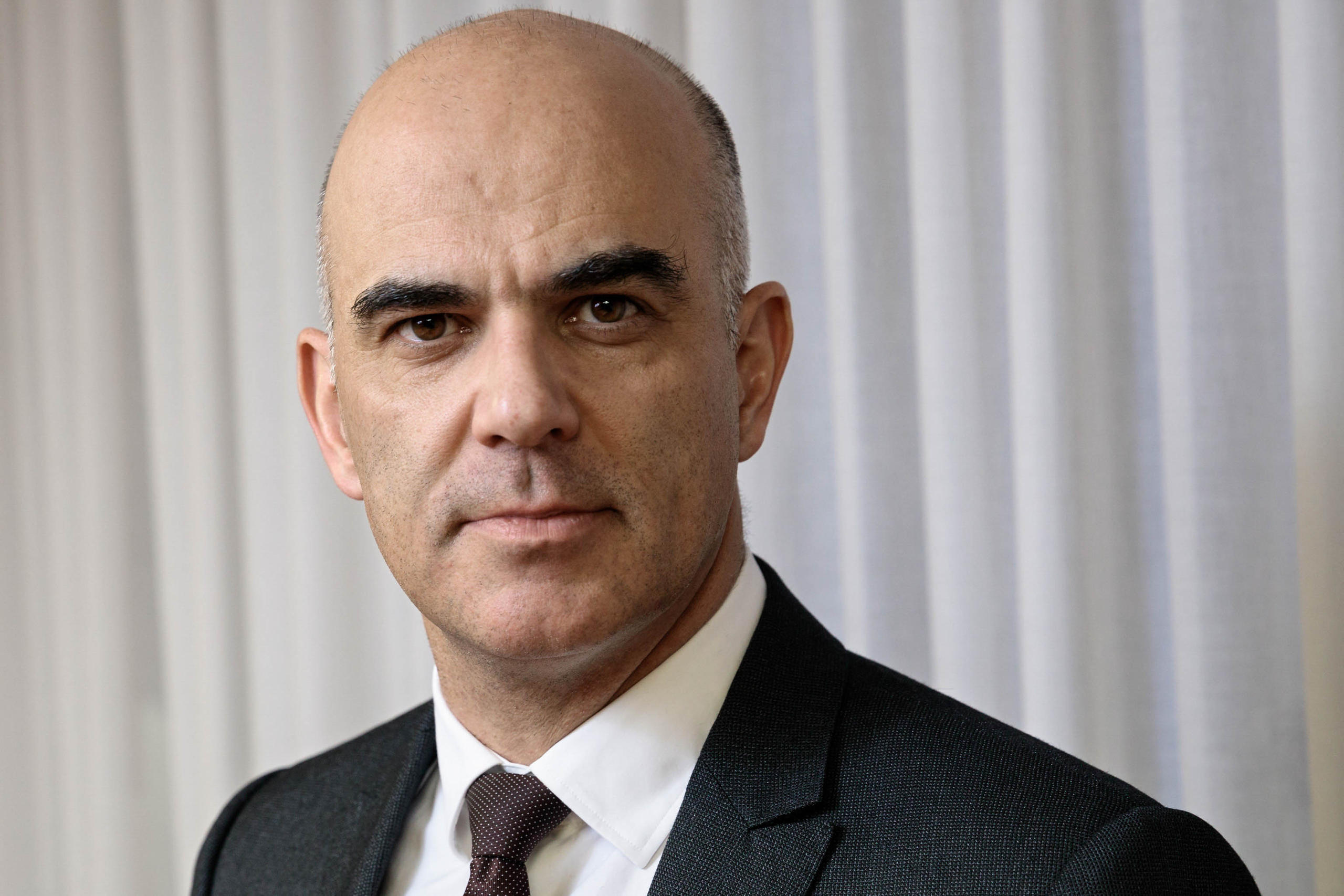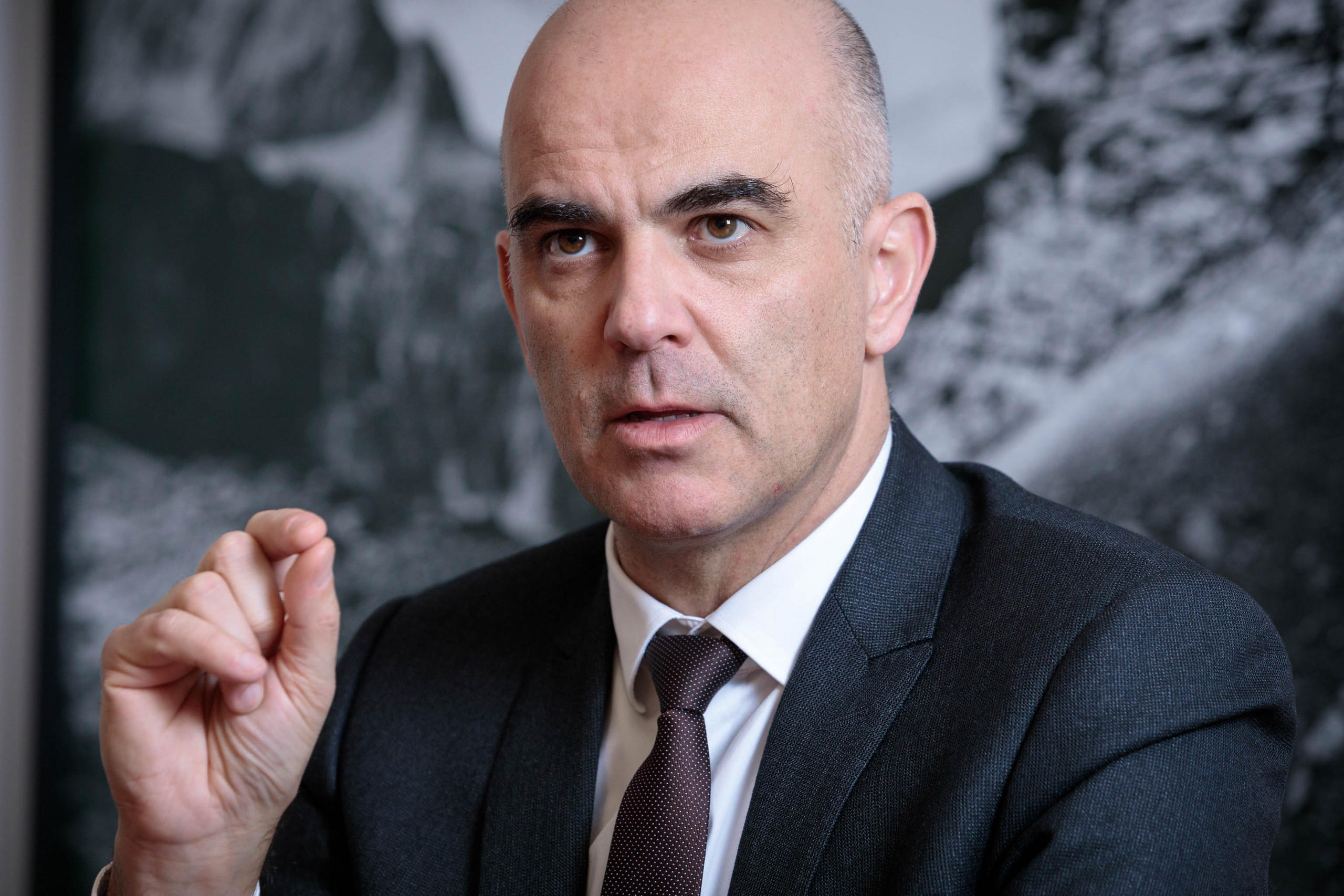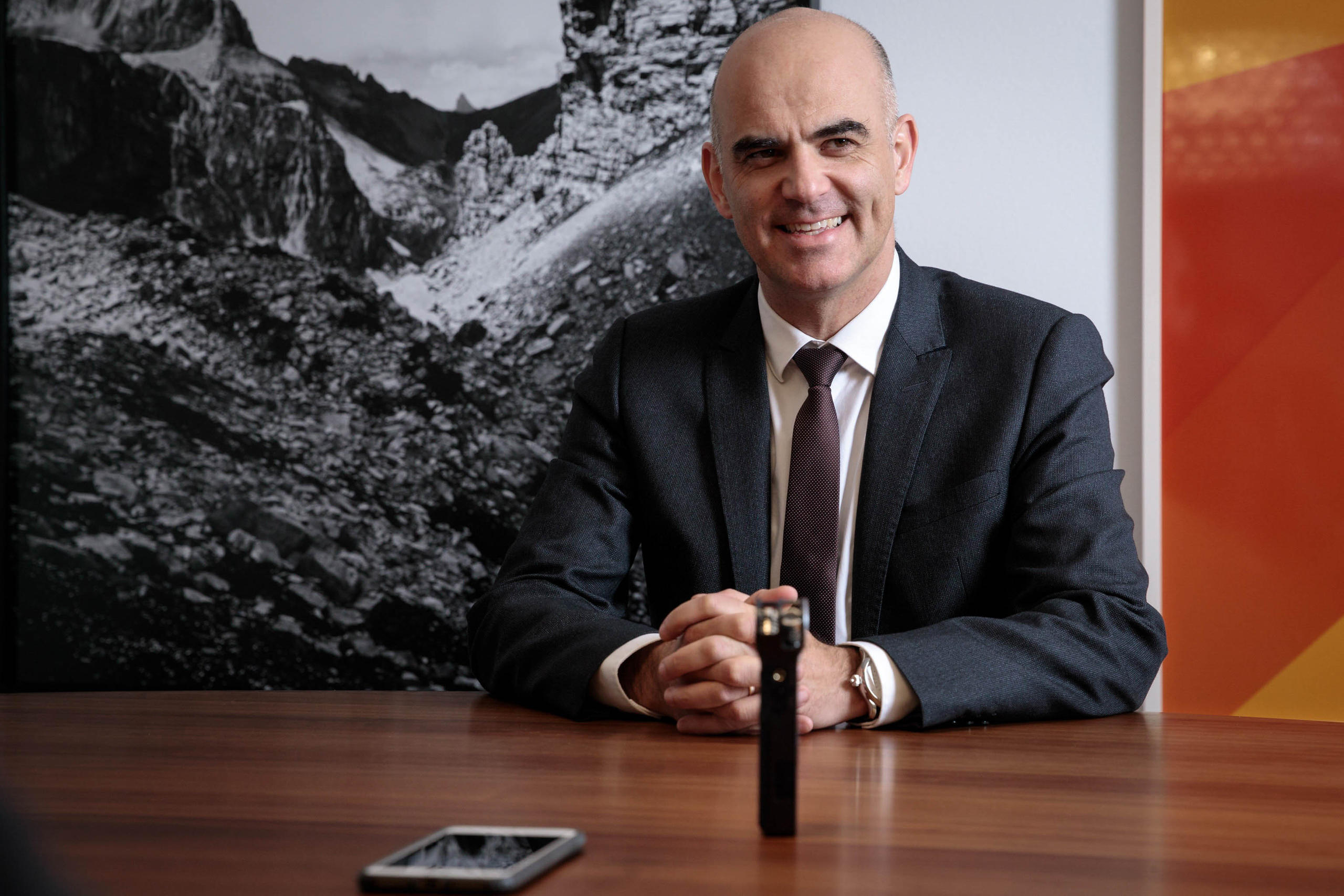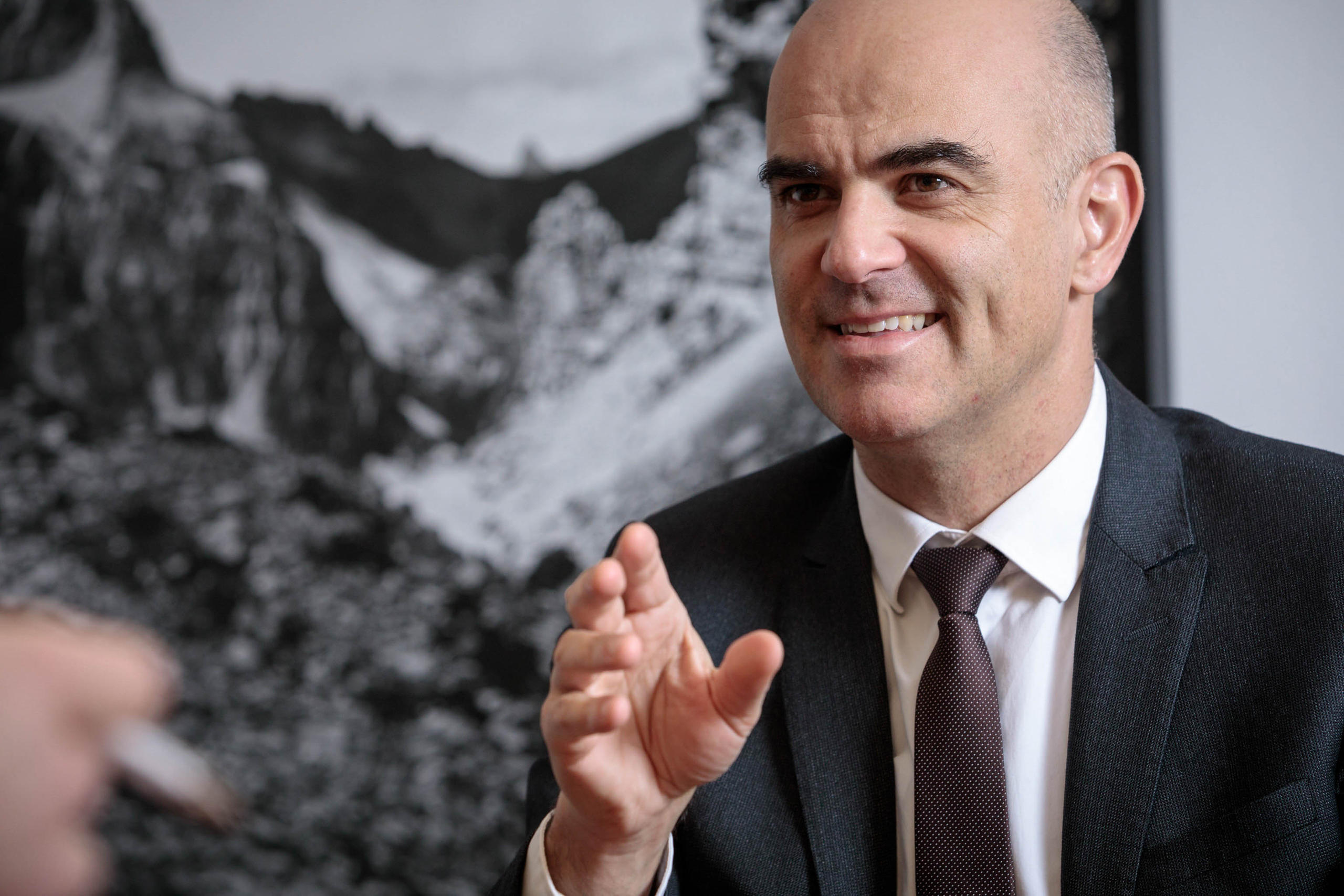
Youngest Swiss president in 84 years takes office

At 45, Alain Berset is the youngest politician to become Swiss president since 1934. He holds the rotating post for 2018. In an interview with swissinfo.ch, Berset remains cautious about a change in Swiss-EU relations and talks about whether Switzerland is experiencing its own ballot box protests.
swissinfo.ch: A few days after you were elected president, you wrote to an unhappy naturalisation candidate in Nyon, canton Vaud, to express your support. Why did you do that?
Alain Berset: I can’t imagine being involved in politics without emotion. Co-existence, mutual respect, dialogue and human contact are integral to the political action I’ve been engaged with for the past 15 years.
Alain Berset became one of the youngest cabinet ministers in history when he was elected to the cabinet in 2011 at the age of 39. He has since headed the Home Affairs ministry, where he is responsible for health, social insurance and culture. He is a member of the leftwing Social Democratic Party.
Born in Fribourg in 1972, married with three children, he studied political and economic science at the University of Neuchâtel. After working as a research scientist and political advisor, he was elected to the Senate in 2003, where he was president in 2009.
On December 6, 2017, he was elected president by parliament by 190 out of 210 valid ballots, a score described as “excellent” by federal policy observers.
When I read about this case, I felt the family would be feeling helpless and somewhat discouraged. I can never judge the naturalisation procedure – I don’t know what happened and, in any event, it’s not my jurisdiction. However, I spontaneously decided to send a short note to this person as a sign of my support.
I simply didn’t want the decision by the Nyon municipal authorities to affect this person’s motivation to pursue the steps of naturalisation.
swissinfo.ch: Most presidents want their term to be defined by a particular issue. That’s not the case with you. Why?
A.B.: I don’t believe in politics led by slogans. When one commits oneself to this field, it’s for the whole of society, in the interest of the whole country, not for particular causes. In Switzerland, the presidency is a role that is shared. One assumes the role for one year and then passes it on to another member of the Federal Council. The sense of continuity is therefore very strong. There are certainly nuances, different ways of saying things, but you don’t become president by saying that you have a year to get your agenda passed.
swissinfo.ch: In your acceptance speech, you said the ability to carry out reforms, to evolve, to keep moving, was the key to Swiss success. But in 2017, major pension reforms that you championed failed at the ballot box. Does this mean that Switzerland is becoming an irreformable country?
A.B.: I hope not, although we failed in two very important reforms last year, namely corporate taxation and old age pensions. As a result, in the short term, you could say that major reforms are no longer possible. But you have to take a longer-term view. It is up to us to cultivate this ability to be in motion and to reform the country.
In Switzerland, we have managed to anticipate most major developments. In the 19th century, for example, Switzerland was the second European country, after Britain, to become industrialised. Two centuries later, we’re still reaping the benefits of the courage that prevailed at the time. Today, in the face of digitalisation and globalisation, nothing would be more detrimental than to hold back while the world around us rapidly evolves.

swissinfo.ch: Although the tools of direct democracy lie at the foundation of the Swiss political system, don’t they slow down progress in this rapidly changing world?
A.B.: Direct democracy does indeed create very important challenges in terms of the speed by which things develop. Sometimes we move more slowly than other countries. But just because the world is changing rapidly does not mean we have to question democracy as we know it. Over the past 20 to 30 years, we’ve been quite successful in adapting.
The uniqueness of the Swiss political system, however, depends on certain factors. First, a diverse, high-quality media landscape, so citizens can make an informed decision when they vote. But it also relies on political parties responsibly making use of the instruments of direct democracy.
swissinfo.ch: With the failure of two major government-sponsored initiatives in 2017, is Switzerland also witnessing the emergence of protest democracy, as with the election of Donald Trump in the United States or the Brexit vote in Britain?
A.B.: There are indeed some similarities. Today, we sometimes forget that direct democracy is not a democracy of opinions but a democracy of decision-making; you aren’t just responding to a poll when you cast your vote. Voting is serious business. It’s been the case recently that citizens have regretted how they voted in certain popular initiatives that were approved, recognising that they had not considered all the consequences of their decision.
The protest vote may be legitimate when one opposes a policy decision. On the other hand, problems arise if a protest vote affects the institutions or how the country operates.

swissinfo.ch: Bearing that in mind, is there any reason to fear the so-called “No Billag” initiative – to get rid of the Swiss Broadcasting Corporation’s licence fee – which goes to the vote on March 4?
A.B.: This initiative does not appear to me to be a protest movement against the institutions. It is more likely a result of the upheavals that have affected the media sector over the past decade.
On the one hand, the emergence of the internet and social networks have revolutionised the way information is produced and disseminated. On the other hand, the appearance of free newspapers has created the illusion, especially for the younger generation, that information can be produced for free.
Still, this is a radical initiative because it requires the outright removal of the fee financing public service broadcasting in a country where it is necessary to guarantee information in four national languages. The licence fee is the price that has to be paid for media diversity in Switzerland.
swissinfo.ch: Next year Swiss voters will probably vote on an initiative from the rightwing Swiss People’s Party requiring the federal constitution take precedence over international law. Does this worry you?
A.B.: This initiative could isolate the country. I’m convinced that the history, identity and success of Switzerland are very strongly tied to its openness. Our country has always been a place of movement, dialogue and encounters. In Geneva, for example, more than 30% of the population does not have a Swiss passport, and this has been the case since the 15th century. A third of our jobs also depend on economic cooperation with other countries.
swissinfo.ch: Switzerland has always been considered the standard bearer of freedom, human dignity and the rule of law. Will it be able to continue to defend these values in a world where economic interests are increasingly becoming more important?
A.B.: We have always been very committed to these values and we will continue to be so. The development of international institutions in our country, particularly in Geneva, is very important in that sense. We have always been there to help, to offer mediation or our good officesExternal link. This role evolves, of course, according to the world around us, but it remains very important for Switzerland.

swissinfo.ch: Switzerland is home to many multinationals and has become the hub for commodity trading. An initiative aimed at responsible multinationals wants to force Swiss companies to respect human rights and the environment. The cabinet has rejected this initiative. Doesn’t this send a bad signal to the rest of the world?
A.B.: The cabinet recognises the importance of this debate and has taken into account the concerns of the initiative’s proponents. Although the cabinet shares their goal, it feels the initiative is not the right way to respond. This is one of the positive aspects of direct democracy: it allows for a problem to be presented, debated and for people to be made aware of it.
swissinfo.ch: In the aftermath of the Arab Spring, Switzerland blocked nearly CHF1 billion ($1 billion) belonging to fallen Egyptian, Libyan and Tunisian dictators and their families. But seven years later, not a single franc has made its way back to those countries. How do you explain this delay to those people whose national assets were looted by their leaders?
A.B.: Switzerland would like to go much faster. But this must be done in line with legal procedures and with the certainty that this money will arrive at the right place. But it is not always easy to know to whom and under what conditions this money can be returned. Although these funds remain frozen in Switzerland, they do not change ownership until we have managed to prove that their origin was illegal.
swissinfo.ch: As president, you will be tasked with leading the thorny issue of Swiss-EU relations this year. The search for a solution involves the negotiation of an institutional framework agreement that oversees bilateral relations. Will such an agreement be concluded in 2018, as European Commission President Jean-Claude Juncker hopes?
A.B.: It’s impossible to say. It was first necessary to find an internal solution for the implementation of the initiative against mass immigration, accepted by a majority of voters and cantons on February 9, 2014.
2017 was interesting because it allowed us to resume dialogue with Brussels in a number of areas. But since Jean-Claude Juncker’s positive visit to Bern in November, there have been several surprising and negative developments.
Switzerland found itself on the EU’s grey list of tax havens. Then the Swiss stock exchange was limited to a one-year right of access to European financial markets. We are willing to continue dialogue, but the events of December were not favourable and do not make things easier. We must now engage in close dialogue to see on what basis of trust and collaboration we can continue.

In compliance with the JTI standards
More: SWI swissinfo.ch certified by the Journalism Trust Initiative
































You can find an overview of ongoing debates with our journalists here . Please join us!
If you want to start a conversation about a topic raised in this article or want to report factual errors, email us at english@swissinfo.ch.